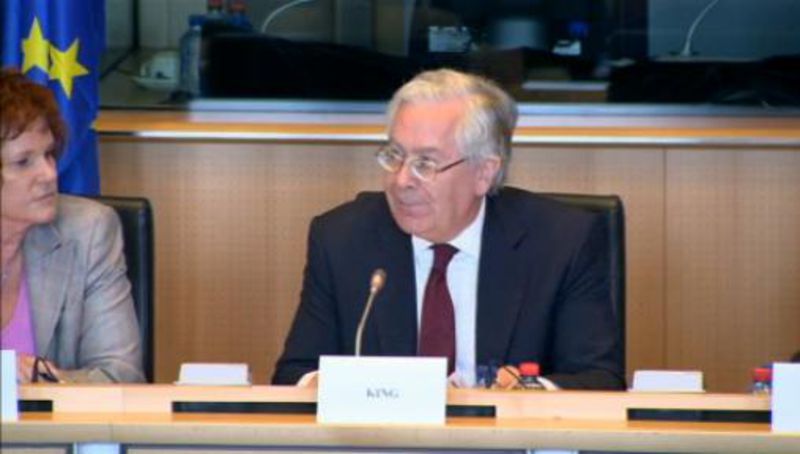Greece should not be saved, according to Gheorghi Anghelov
Adelina Marini, February 28, 2010
 The story of Greece's financial situation not only caused serious economic and political turbulences in the eurozone but also gave reason for numerous discussions about how and whether Greece should be helped so as to prevent an increase of the pressure over the rest of the euro countries. In the Blog of Economics the senior economist from the Open Society Institute Gheorghi Anghelov writes that Greece should not be saved and if it could not handle its problems by itself, it should ask the IMF for help because, otherwise this might stimulate the Greeks and other financially undisciplined states to continue piling on public debt.
The story of Greece's financial situation not only caused serious economic and political turbulences in the eurozone but also gave reason for numerous discussions about how and whether Greece should be helped so as to prevent an increase of the pressure over the rest of the euro countries. In the Blog of Economics the senior economist from the Open Society Institute Gheorghi Anghelov writes that Greece should not be saved and if it could not handle its problems by itself, it should ask the IMF for help because, otherwise this might stimulate the Greeks and other financially undisciplined states to continue piling on public debt.
Getting help from the IMF, however, is something the Eurogroup president Jean-Claude Juncker, who is also the prime minister and minister of finance of Luxembourg, is desperately trying to avoid because it will undermine confidence in eurozone's capabilities to deal on its own without having a political union. To euinside's question whether an IMF assistance might lead to a greater loss of confidence in the euro area, Gheorghi Anghelov gave the following reply:
The history of the problem is longer. Several years ago the big euro area countries had problems  with their budgetary deficits. According to the so called Stability and Growth Pact, they had to be fined so as to be forced to maintain some fiscal discipline. But as Germany and France are the biggest EU nations, they were not fined. Practically the pact got loose because of the big states.
with their budgetary deficits. According to the so called Stability and Growth Pact, they had to be fined so as to be forced to maintain some fiscal discipline. But as Germany and France are the biggest EU nations, they were not fined. Practically the pact got loose because of the big states.
Since the Pact is not working, the only way to respect some reasonable fiscal discipline rules is market pressure. When a country has too big public debt and budgetary deficits, the market begins to doubt its credit capability, higher interest rates are required because of the higher risk and if the state does not take any measures, the result is default (no one wants to give any more credit to such a country and it will go bankrupt). Greece took advantage of the loosening of the Pact but cannot avoid market discipline.
Now the EU and the Eurogroup are trying to loose the market pressure too by promising to save Greece if it reaches the default stage. In other words, after they removed the Stability and Growth Pact's pressure, now they are removing the market pressure as well. This is a recipe for a disaster because any pressure for prudent policy disappears. This might lead to catastrophic results (let us remind that the market pressure over US banks was removed the very same way which allowed them to pile large risks and this led to financial collapse).
A possible solution should be in the opposite direction - market discipline should not be hampered, it should be even assisted through tightening of the Stability and Growth Pact rules. If the euro area decides to save Greece today, then it will create stimuli tomorrow another country to end up with large debt and deficit because the problems of the unreasonable countries pass over to the reasonable ones. On the other hand, if the eurozone does not save Greece and leaves to the IMF, then the problem is smaller - Greece will again get assistance but against tight requirements which the IMF knows very well how to apply. In other words, the problem will be limited because the unreasonable euro area countries will know that because of their imprudence the IMF will come for them and they will have a stimulus to be prudent.
If it wants, the EU could create its own European Monetary Fund as Daniel Gross from the CEPS proposes. Similar mechanism must exist - to fine the states which do not comply with the fiscal discipline and to stimulate them to be prudent. So far such a thing does not exist and the IMF is the only working alternative. Furthermore, it has some political advantages - on the one hand the Greeks will be angry with the IMF and not the EU (i.e. euro skepticism among the Greeks will be avoided).
On the other hand, the German, Dutch and the rest of the Western voters would not have a reason to be sorry that they are part of the eurozone (and vice versa, if the euro area would save Greece, this might create euro skeptic trends to the West - people will wonder why the euro is being created in the first place since it stimulates such imprudence). Not to mention Eastern Europe which was left to the IMF and no one helped it. The new member states might be put into unequal position if the attitude towards Greece is different.
Anyway, the argument Greece to be left to the IMF is strong. The fact that Greeks' pride will be affected or that the pride of the euro area countries will be affected because of the IMF is a very weak argument. Everyone who has made mistakes that led him to default, should forget its pride at least until it goes out of the situation, the senior Open Society Institute economist Gheorghi Anghelov wrote for euinside.
*all underlinings and bolds of Gheorghi Anghelov's text were made by euinside.
 | © European Union
| © European Union | © European Union
| © European Union | © European Union
| © European Union